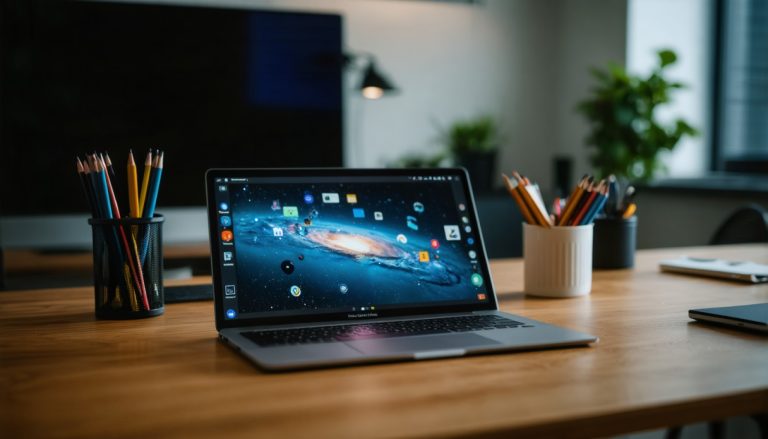
- Meta’s Reality Labs laid off staff, including the team for the Supernatural VR app, to focus on future mixed reality projects.
- Microsoft offers underperforming employees a choice between a severance package and a performance-improvement plan, aligning with a trend of efficiency optimization.
- Google requires employees to return to the office three days a week, shifting away from flexible remote work.
- Intel plans a hybrid schedule with four on-site days starting in September 2025 to enhance in-person collaboration.
- Oppo, Vivo, and Xiaomi have launched new products, highlighting battery life and fitness tracking features.
- Samsung introduces AI-driven home appliances in India, pushing for technology to become seamlessly integrated into everyday life.
- The overarching theme is adaptability, as companies adjust strategies to thrive amid technological and market changes.
In the sprawling universe of technology, the recent week has pulsed with dynamic energy and strategic maneuvers, as major corporations recalibrate their course in a post-pandemic landscape. At the heart of this tectonic shift, Meta’s Reality Labs has made headlines with its decision to trim its workforce. Oculus Studios, renowned for its groundbreaking VR experiences, witnessed a jolt as the team behind the Supernatural VR fitness app encountered significant layoffs. This move underscores Meta’s resolve to streamline operations and hone its focus on future mixed reality ventures.
Meanwhile, Microsoft grapples with an internal shake-up akin to Amazon’s debated “Pivot” strategy. The tech giant now offers underperforming employees a stark choice: accept a 16-week severance package or embark on a performance-improvement plan. This pragmatic, albeit controversial, approach highlights a growing trend among tech behemoths to optimize efficiency amidst market pressures.
Google is redefining remote work, hinting at tides of change. Employees once reveling in the freedom of their pajamas now face an ultimatum: return to the office thrice weekly or risk termination. This policy marks a significant departure from Google’s flexible work ethos and underlines a corporate yearning for palpable collaboration.
Intel, not one to be left behind in the wave of workplace reevaluations, has announced a policy requiring its employees to be on-site four days each week starting September 2025. This strategy, as articulated by CEO Lip-Bu Tan, aims to bolster in-person teamwork, considered crucial for sparking innovation.
On the product front, the market is abuzz with launches from Xiaomi, Oppo, and Vivo. The spotlight is on the Oppo K13 5G, promising battery longevity with a 7,000 mAh powerhouse, while Vivo welcomes the T4 5G, complete with a 7,300 mAh battery and a 32MP selfie camera. Not to be outdone, Xiaomi’s Redmi Watch Move boasts over 140 workout modes and an AMOLED screen, catering to fitness aficionados.
A notable undercurrent in these developments is the pervasive embrace of artificial intelligence. Samsung’s rollout of India-centric AI-infused home appliances marks a strategic pivot towards smarter, interconnected lifestyles. This initiative signals a commitment to making advanced AI amenities universally accessible, envisioning a future where technology seamlessly integrates into daily life.
Through industry upheavals and technological innovation, one key takeaway emerges: adaptability is paramount. As companies recalibrate their strategies, they are forging paths not just to survive but thrive in an ever-evolving landscape. The recent saga in tech underscores a clarion call for agility, signaling the dawn of a new era where the only constant is change itself.
Tech Giants in Transition: What’s Driving Layoffs, New Policies, and Product Launches?
Meta’s Strategic Restructuring: A Deeper Dive
Meta’s Reality Labs’ recent layoffs, particularly impacting the Supernatural VR fitness app team, underscore the company’s strategic pivot towards mixed reality. The need to streamline operations is driven by several factors:
– Cost Efficiency: By focusing on core projects, Meta aims to allocate resources more effectively, cutting down on peripheral projects.
– Future Technology Investment: Emphasizing mixed reality is seen as a step towards what Meta believes is the future of digital interaction.
Microsoft’s Controversial Strategy Review
The introduction of a performance-improvement plan or severance package reflects a ruthless efficiency trend in the tech sector:
– Performance Metrics: By tightening performance expectations, Microsoft aims to boost productivity and foster a competitive workplace culture.
– Employee Morale: Such policies can be a double-edged sword, potentially affecting employee morale and job satisfaction negatively.
The Shift Back to Office Spaces
Google and Intel’s Return-to-Office Policies:
– Google: Mandating a return to the office three times a week aims to revive collaborative synergy that remote work might stifle.
– Intel: By September 2025, Intel plans to have employees on-site four days a week. The rationale is to spark innovation through spontaneous in-person interactions.
New Products Making Waves
Oppo, Vivo, and Xiaomi Innovations:
– Oppo K13 5G: Prioritizes battery life with a 7,000 mAh battery, but also focuses on 5G connectivity for faster internet speed, providing great value for power users in remote areas.
– Vivo T4 5G: Takes advantage of a high-capacity 7,300 mAh battery and a 32MP selfie camera, targeting the social media-savvy audience.
– Xiaomi Redmi Watch Move: With over 140 workout modes, it’s tailored for fitness enthusiasts who want comprehensive health tracking without sacrificing style.
AI Integration into Everyday Life
Samsung’s AI Initiatives in India:
– Localization: By tailoring AI-driven home appliances for the Indian market, Samsung showcases a growing trend towards personalized technology solutions.
– Sustainability: AI can optimize energy use in appliances, aligning with global sustainability goals.
Fast-Evolving Tech Trends: What’s Next?
– AI Domination: Expect continued integration of AI in both consumer tech and enterprise solutions. AI’s role in personalization and efficiency will likely expand.
– Remote Work Evolution: Hybrid work models will evolve, possibly leading to innovative coworking spaces that marry flexibility with interaction.
Quick Tips for Navigating Tech Changes
– Digital Upskilling: As tech landscapes shift, investing in learning about AI and emerging technologies positions professionals for growth.
– Adaptable Work Practices: Embrace flexible work models and tools to remain competitive.
– Leverage New Gadgets: Exploring new tech products can improve both personal productivity and lifestyle.
For further insights into tech trends, visit Meta, Microsoft, and Samsung.
Conclusion
The current upheaval in tech serves as a reminder of the dynamic nature of the industry. Corporations are pivoting strategies, policies, and products to align with a rapidly changing world, emphasizing adaptability and foresight as key survival tools.
By staying informed and agile, both companies and individuals can not only navigate but also thrive in the evolving tech landscape.



